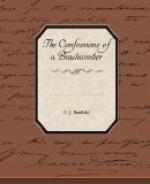Once George illuminated his conversation with an aphorism. Describing a battle between the Tully River blacks and those of Clump Point, in which his mate, Tom of Dunk Island (leader of the Clump Point party), had been severely wounded, he said—“’Nother fella boy from outside, come up behind Tom. He no look out that way. That boy tchuk ’em boomerang. Boomerang stick in leg belonga Tom. Tom no feel ’em first time. He stan’ up yet. Bi’mby when want walk about, tumble down. Look out. Hello! see ’em boomerang alonga leg. He no more can walk about.”
The boss remarked—“Might be long time, Tom feel ’em leg sore.”
George—“Ah! me like see ’em kill alonga head. Finish ’em one time. Danger nebber dead.” Whether George wished to enforce the opinion that in battle nothing short of death was glorious, or that Tom though wounded was still valorous and would live to fight again, was not clear, but “Danger nebber dead,” probably represents the only aboriginal aphorism extant.
George is not the least superstitious. He takes everything for granted. Rain, in his opinion, comes from a big tank up above somewhere. Asked as to his belief in the personal “debil-debil,” of whom the mainland boys have such dread that few will stir out after dark, he said with a guffaw—“Me nebber bin see one yet. Suppose me see ’em, me run ’em!” George is, therefore, as yet unable to give a description of the fiend; but from hearsay authority declares that it possesses three eyes, two in the ordinary position, and one at the back of the head. It is believed that the third eye insures the “debil-debil” against all possible surprises, thus preserving the mystery of identity.
Though he has not a shadow of respect for the “debil-debil,” George has a firm faith in the existence in the neighbourhood of Cooktown of a camp of what he calls “groun’ gins.” His experience with these mysterious subterranean sirens he thus describes—
“Little bit outside Cooktown camp belonga groun’ gins. Me and Sargen’ go look big corrobboree; my word. Some gins come out alonga groun’ from hole. When go down, groun’ close up himself, like winda. My word, me fright. Me shake. One good fella nice gin come up. Sargen’ say—’You go corrobboree dance along that fella.’ Me say—’We go home now, me fright. We want go alonga town. This no good place.’ Sargen’ laugh little bit. He say—’No, my boy, you no fright. All right here. You dance alonga that fella gin—good nice gin.’ Me go up. Me feel ’em fright. Feel ’em cold inside. Too much fright. My word; han’ belonga that fella gin—cold like anything. That gin say—’Where you from?’ Me say—’Me come from alonga town.’ That gin say—’What you look out?’ Me say—’Me look out bullocky, musser ’em cattle. Tail ’em up. Look out weaner alonga paddick. Plenty hard work.’ Me dance little bit alonga that gin. Not much. Too fright. Bi’mby that gin go down below. Groun’ shut ’em up. All day down below. Come up night time. Carn come up alonga sun. Soft fella that. Suppose come up alonga sun, sun kill ’em. Too sof’ altogether.”




